Contents of JProcRSNSW, Vol. 157, Part 1, June 2024
The complete Volume 157, Part 1, June 2024.
Robert E. Marks
Editorial: The New York Times has noticed us
Journal & Proceedings of the Royal Society of New South Wales 157: 1-4
Refereed Paper:
Thomas Mesaglio, Hervé Sauquet, William K. Cornwell.
Rapid progress on the photographic documentation of Australia's flora.
Journal & Proceedings of the Royal Society of New South Wales 157: 5-14
Curated Paper:
Robert E. Marks.
Mabberley's Botanical Revelation: The future.
Journal & Proceedings of the Royal Society of New South Wales 157: 15-19
The Royal Society of NSW and Five Academies Forum:
Our 21st Century Brain.
The Governor, Margaret Beazley.
Opening Address.
Journal & Proceedings of the Royal Society of New South Wales 157: 20-22
Susan Pond.
Welcome and Acknowledgements.
Journal & Proceedings of the Royal Society of New South Wales 157: 23-24
Keynote Addresses.
George Paxinos.
KN: Is the brain in the Goldilocks zone?
Journal & Proceedings of the Royal Society of New South Wales 157: 25-28Lucy Palmer.
KN: The enigmatic brain: from synapses to neural networks.
Journal & Proceedings of the Royal Society of New South Wales 157: 29-34Joshua Gordon.
KN: Lessons from developmental and cognitive neuroscience.
Journal & Proceedings of the Royal Society of New South Wales 157: 35-37
I The Developing Mind.
Penny van Bergen.
I The Developing Mind.
Journal & Proceedings of the Royal Society of New South Wales 157: 38-39Adam Guastella..
Using translational neuroscience and technology for personalised medicine and impact in child neurodevelopment.
Journal & Proceedings of the Royal Society of New South Wales 157: 40-42Sharynne McLeod.
Children’s communication and the developing mind: a challenge for Australia.
Journal & Proceedings of the Royal Society of New South Wales 157: 43-48Anne Castles.
From language to literacy: understanding dyslexia.
Journal & Proceedings of the Royal Society of New South Wales 157: 49-52Kate Highfield.
Young children in digital worlds: multi-modal development?
Journal & Proceedings of the Royal Society of New South Wales 157: 53-56
II The Brain: Social, Cultural and Philosophical Perspectives.
Pip Pattison.
II The Brain: Social, Cultural and Philosophical Perspectives.
Journal & Proceedings of the Royal Society of New South Wales 157: 57-58Andrew Chanen.
Not waving but drowning: personality development and Personality Disorder.
Journal & Proceedings of the Royal Society of New South Wales 157: 59-63Andrew Leigh.
Australia’s “friendship recession.”
Journal & Proceedings of the Royal Society of New South Wales 157: 64Jennifer Kent.
Social interactions in urban spaces.
Journal & Proceedings of the Royal Society of New South Wales 157: 65-70Jakelin Troy.
AI and Indigenous ways of thinking.
Journal & Proceedings of the Royal Society of New South Wales 157: 71-75David Bradden-Mitchell.
“Mental disorder” is not a useful, fundamental category.
Journal & Proceedings of the Royal Society of New South Wales 157: 76-79
III The Brain Disease Burden in Adults.
Anthony Cunningham.
III The Brain Disease Burden in Adults.
Journal & Proceedings of the Royal Society of New South Wales 157: 80Glenda Halliday.
Brain cellular ageing.
Journal & Proceedings of the Royal Society of New South Wales 157: 81-84Sharon Naismith.
Turning the tide on dementia: prevention, diagnosis, treatment and quality of care.
Journal & Proceedings of the Royal Society of New South Wales 157: 85-91Lucette Cysique & Andrew Lloyd.
Viruses and pathological brain ageing: a challenge we must confront.
Journal & Proceedings of the Royal Society of New South Wales 157: 92-106
IV Turbocharging Human Intelligence with Artificial Intelligence.
Ian Oppermann.
IV Turbocharging Human Intelligence with Artificial Intelligence.
Journal & Proceedings of the Royal Society of New South Wales 157: 107-108Sally Cripps.
Artificial and human intelligence for scientific discovery.
Journal & Proceedings of the Royal Society of New South Wales 157: 109-118Stela Solar.
Doing AI well: the Responsible AI network.
Journal & Proceedings of the Royal Society of New South Wales 157: 119-122Lyria Bennett Moses.
Artificial intelligence: affordances and limits in the context of judging.
Journal & Proceedings of the Royal Society of New South Wales 157: 123-129
V Implications for the Future.
Ian Hickie, Pip Pattison, Helen Christensen, Peter Baume, Jaky Troy.
V Implications for the Future.
Journal & Proceedings of the Royal Society of New South Wales 157: 130-140
Ph.D. Thesis Abstracts:
Brendan J. Byatt.
Synthesis of glyphaeaside C and structural revisions of the glyphaeaside alkaloids.
Journal & Proceedings of the Royal Society of New South Wales 157: 141-142
Tessa Delaney.
The potential of online food ordering systems to increase healthy food purchasing behaviours.
Journal & Proceedings of the Royal Society of New South Wales 157: 143-145
Amy Jane Hulme.
Specification of dorsal root ganglia sensory neuron subpopulations derived from human pluripotent stem cells.
Journal & Proceedings of the Royal Society of New South Wales 157: 146-147
Tran Thi Bich Thuy.
Development of composite films from seaweed hydrocolloids, Gac by-product, essential oils and plant extracts for preservation of fresh prawn.
Journal & Proceedings of the Royal Society of New South Wales 157: 148-149
Chye Toole-Anstey.
Narratives of child-to-parent violence: an inquiry into mothers' stories and practitioners' responses for child-to-parent violence.
Journal & Proceedings of the Royal Society of New South Wales 157: 152-151
Ali Yousefi.
Development of form-stable phase change material cementitious composite using recycled expanded glass and conductive fillers for thermal energy storage application.
Journal & Proceedings of the Royal Society of New South Wales 157: 152-154
The Royal Society of New South Wales Awards for 2024:
Journal & Proceedings of the Royal Society of New South Wales 157: 155-159
Later
ISSN (online): 2653-1305
RSNSW Council Elections 2024
Statements from candidates
Nominees for Councillor positions were requested to provide brief statements outlining how their expertise and experience would fit them for these roles and would benefit the Society. Where these were provided by the close of nominations at 5.00 pm AEDT on Friday 8 March 2024, they are listed below in alphabetic order and are accessible via the links shown.
Office-bearer and Councillor candidates
- Sean Brawley — candidate for Councillor
- Sally Cripps — candidate for Councillor
- Vince Di Pietro — candidate for Councillor
- Medy Hassan — candidate for Councillor
- Elizabeth Killen — candidate for Councillor
- Robert Marks — candidate for Councillor
- Peter Wells— candidate for Treasurer
Sean Brawley FRSN — candidate for Councillor
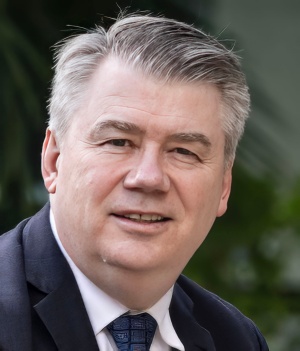 I am currently Professor of History and Deputy Vice-Chancellor (Strategy and Assurance) at the University of Wollongong. I have served on the Society's Bicentennial Committee from 2020–2022, with my last year as Secretary. I served on the RSNSW Council since 2022 and during this time also chaired the Fellow and Members Assessment Committee (FMAC). During this time, FMAC undertook a range of process and procedural revisions to improve the Committee's work and stakeholder engagement. The Committee also made several suggestions for revisions to our by-laws relating to admission and these were voted on by the membership in 2023. I would like to continue to make a contribution to the work of the Society through the role of an Ordinary Member of the Council.
I am currently Professor of History and Deputy Vice-Chancellor (Strategy and Assurance) at the University of Wollongong. I have served on the Society's Bicentennial Committee from 2020–2022, with my last year as Secretary. I served on the RSNSW Council since 2022 and during this time also chaired the Fellow and Members Assessment Committee (FMAC). During this time, FMAC undertook a range of process and procedural revisions to improve the Committee's work and stakeholder engagement. The Committee also made several suggestions for revisions to our by-laws relating to admission and these were voted on by the membership in 2023. I would like to continue to make a contribution to the work of the Society through the role of an Ordinary Member of the Council.
Sally Cripps FRSN — candidate for Councillor
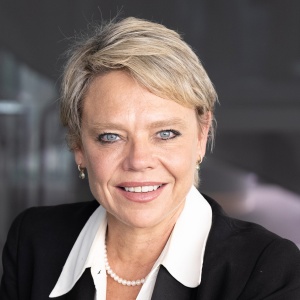 My research focuses on the development of new methods in mathematical statistics and machine learning to address national and global challenges, in areas including mental health, education, natural resources and social disadvantage. In achieving this I have founded and led large multidisciplinary teams focussed on delivering research excellence and impactful outcomes.
My research focuses on the development of new methods in mathematical statistics and machine learning to address national and global challenges, in areas including mental health, education, natural resources and social disadvantage. In achieving this I have founded and led large multidisciplinary teams focussed on delivering research excellence and impactful outcomes.
I am currently Director of Technology at the Human Technology Institute and Professor of Mathematics and Statistics at UTS. My leadership positions include co-founder and co-director of the University of Sydney’s Centre for Translation Data Science (CTDS), founder and Director of the ARC’s Training Centre in Data Analytics for Resources and Environments (DARE), and Research Director of Analytics and Decision Science in CSIRO’s Data61. I have served as a board member on several institutes including Climate Services for Agriculture.
If elected there are two key contributions I would make. The first is to galvanize the society to address global and domestic challenges. This would be achieved by organising workshops to engage the Society to identify these challenges and to take them to government and industry to attract support and build enthusiasm to solve and address these problems with scientific research.
The second is to increase the participation of younger researchers. One mechanism for doing this would be to explore another grade of membership to which younger researchers could subscribe. Another option would be to secure scholarships and funding for early and mid-career researchers to work collaboratively with Society Fellows on the key challenges the RSNSW has identified.
Vince Di Pietro AM CSC FRSN — candidate for Councillor
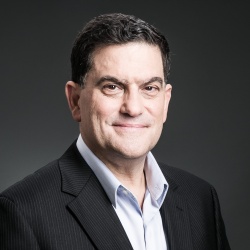 Since March 2018 I have been a Fellow of the Royal Society and have enjoyed many opportunities — lectures, dinners, award ceremonies, travel, and most recently was entrusted to deliver the Annual Four Societies lecture for 2024.
Since March 2018 I have been a Fellow of the Royal Society and have enjoyed many opportunities — lectures, dinners, award ceremonies, travel, and most recently was entrusted to deliver the Annual Four Societies lecture for 2024.
Now I am excited and hope to catch the voters’ eye that I may be able to bring my perspectives, skills and professional links to a governance role in our multi-disciplinary Society. I am prepared to roll my sleeves up and assist with existing programs, initiatives, and plans. Once more familiar with the work at hand, I am keen to contribute new ideas to the Council for consideration and actively participate in their planning and implementation.
First, serving our nation and its navy for forty years commencing as a trainee pilot, accumulating 5,000 flying hours in aeroplanes and helicopters, and retiring as Commander of the Fleet Air Arm. Punctuating my flying career were many opportunities to acquire skills, and professional military and tertiary education. Leadership roles included responsibility and accountability for ship and equipment certification, safety management systems, capability requirements analysis, international engagement, shore infrastructure and diplomatic representation for Australia in the United States. Second, as Chief Executive of Lockheed Martin Australia and New Zealand. And third, as the Local Recovery Coordinator for the 2019/2020 Currowan Bushfire. Finally and most recently as a consultant I designed, constructed and commissioned 26 Community Information Hubs under a $2m grant from Federal and State government.
Medy Hassan OAM FRSN FAIB — candidate for Councillor
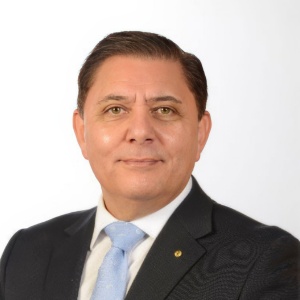 As a member of the University of Canberra Executive Council, I have held and currently hold adjunct professorships with Western Sydney University, the University of Canberra, RMIT University, and various international universities. Additionally, I am a Fellow of the Royal Society of NSW, the Australian Institute of Building, and an Industry Fellow at the University of Queensland.
As a member of the University of Canberra Executive Council, I have held and currently hold adjunct professorships with Western Sydney University, the University of Canberra, RMIT University, and various international universities. Additionally, I am a Fellow of the Royal Society of NSW, the Australian Institute of Building, and an Industry Fellow at the University of Queensland.
Throughout my 25-year professional career, I have successfully completed $3 billion of investments and collaborated with all tiers of government, global institutions, leading universities/research institutes, and venture organisations in governance, funding, philanthropic and strategic roles.
My expertise in corporate leadership, higher education/research, funding, and engagement with key government and industry think tanks will be instrumental in supporting the Society’s Master Plan, particularly in safeguarding our financial future (Future Fund) and enhancing awareness of the Society and its initiatives.
Founding Haus Holdings, a national impact investment organisation, and co-founding private equity groups Vitae Capital and GenCap Wealth, have allowed me to prioritise my impact and investments in research, innovation, reform, and wellbeing.
Recognised with numerous national awards for Excellence and Innovation, including the Order of Australia Medal, I attribute my success to clarity of purpose, continuous progress, and upholding the highest standards of integrity.
My dedication to promoting equality is evident through the establishment of a 'diversity and inclusion scholarship' in design and the built environment at the University of Canberra. Furthermore, I possess a deep-rooted passion for the arts and creative industries. I am confident that my diverse experiences will add value and enhance the Society's reputation and performance.
Liz Killen MRSN — candidate for Councillor
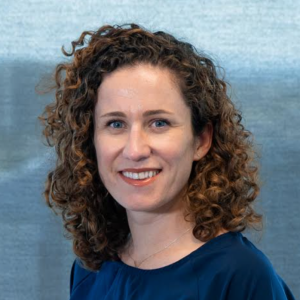 Liz Killen MSc PhD is currently the Research Director with the Social Research Centre, an ANU Enterprise, and a visiting fellow of ANU. Immediately prior to this role, she served as Assistant Manager in the science policy team of the Office of Australia's Chief Scientist.
Liz Killen MSc PhD is currently the Research Director with the Social Research Centre, an ANU Enterprise, and a visiting fellow of ANU. Immediately prior to this role, she served as Assistant Manager in the science policy team of the Office of Australia's Chief Scientist.
This background supports me to contribute to Society, through understanding of:
- risk and audit, gained through 3-year membership of the British Educational Research Association (BERA) Risk and Audit Committee
- membership processes, including chartered status, gained through my previous role as Membership and Education Officer of the Nuclear Institute, a UK learned society
- the role and influence of the academies, gained through liaison with Australian and British Academies during former roles within the Australian and UK Government, in the Office of the Chief Scientist
- journal processes, gained through previous roles as Editor and Founder of two student-run academic journals (Cambridge Open Research Journal and Cambridge Journal of Science & Policy).
In addition to my contributions to the Society drawing from my experience above, I would provide my support to the society’s drive to recruit more young and diverse members.
Robert Marks FRSN — candidate for Councillor
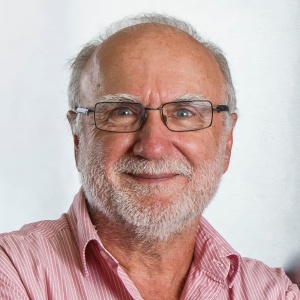 In addition to my academic expertise (PhD, Stanford; Emeritus Professor, UNSW), I have twenty years’ experience of editing peer-reviewed journals across a variety of disciplines, including eight years for the Royal Society’s own Journal (with Council membership). I have edited sixteen issues of the Journal with a wide range of interesting, new, and timely articles on topics the Society deeply values, including many commissioned papers. Amongst these are significant papers by Thomas Keneally, Michelle Simmons, Hugh White, Martin Green, Eddie Holmes, the late Adrian Lee, and the late Ann Moyal. In 2020 we published an extra issue devoted to the 2019 Biennial Symposium of the ANZ Associations of von Humboldt Fellows. I organised the paper links in the Journal archive in 2016. The “Point Counterpoint” section in the Journal is my innovation, exploring differences in scientific and intellectual opinion. I am fondest of the paper I commissioned on the development of blue pigments — history and science is a powerful mix. As ongoing Editor, I think it is important that I continue on Council, given the centrality of the Journal to the Society. I bring to the Council dedication, experience, enthusiasm, and imagination.
In addition to my academic expertise (PhD, Stanford; Emeritus Professor, UNSW), I have twenty years’ experience of editing peer-reviewed journals across a variety of disciplines, including eight years for the Royal Society’s own Journal (with Council membership). I have edited sixteen issues of the Journal with a wide range of interesting, new, and timely articles on topics the Society deeply values, including many commissioned papers. Amongst these are significant papers by Thomas Keneally, Michelle Simmons, Hugh White, Martin Green, Eddie Holmes, the late Adrian Lee, and the late Ann Moyal. In 2020 we published an extra issue devoted to the 2019 Biennial Symposium of the ANZ Associations of von Humboldt Fellows. I organised the paper links in the Journal archive in 2016. The “Point Counterpoint” section in the Journal is my innovation, exploring differences in scientific and intellectual opinion. I am fondest of the paper I commissioned on the development of blue pigments — history and science is a powerful mix. As ongoing Editor, I think it is important that I continue on Council, given the centrality of the Journal to the Society. I bring to the Council dedication, experience, enthusiasm, and imagination.
Peter Wells FRSN — candidate for Treasurer
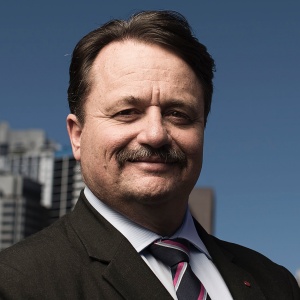 I have over 40 years’ of experience working in the accounting area, initially with an antecedent of one of the so-called Big 4 accounting firms and then in academia. This included a period as the Head of the Accounting Discipline Group at the University of Technology Sydney and now as an Emeritus Professor following my retirement. I am a Fellow of Chartered Accountants Australia and New Zealand and a member of the Academic Advisory Panel of the Australian Accounting Standards Board.
I have over 40 years’ of experience working in the accounting area, initially with an antecedent of one of the so-called Big 4 accounting firms and then in academia. This included a period as the Head of the Accounting Discipline Group at the University of Technology Sydney and now as an Emeritus Professor following my retirement. I am a Fellow of Chartered Accountants Australia and New Zealand and a member of the Academic Advisory Panel of the Australian Accounting Standards Board.
I have considerable experience in financial management and have been a director of a not-for-profit organisation providing disability services in western Sydney for over a decade. This period includes transitioning to NDIS funding which presented many challenges. Importantly, the organisation continues to be financially viable notwithstanding the difficulties faced by those in the sector.
I think with a combination of professional skills and experiences I am well qualified to hold the position of Treasurer and contribute positively to the financial management of the Society.
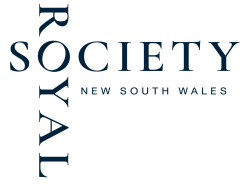 At the Society's 157th Annual General Meeting, held on 17 April 2023, the results of the 2024 Council elections were announced.
At the Society's 157th Annual General Meeting, held on 17 April 2023, the results of the 2024 Council elections were announced.
The election was conducted by electronic ballot over three weeks from noon on 25 March until noon on 15 April. Some 200 ballots were submitted by 691 eligible voters, corresponding to a return rate of 29%.
Procedural Motions
- Approval of Minutes of the 156th Annual General Meeting (2023) — For: 157 votes; Against: 0 votes; Abstentions: 43
- Receipt of the 2023 Annual Report and Financial Statements — For: 179 votes; Against: 2 votes; Abstentions: 19
- Confirmation of Auditors for 2024 — For: 191 votes; Against: 1 vote; Abstentions: 8
- Special Resolution to make the Editor of the Journal and Proceedings of RSNSW an appointed member of Council — For: 191 votes; Against: 3; Abstentions: 6
Accordingly, all four procedural motions were declared as having passed.
Election of Treasurer (one candidate)
- Emeritus Professor Peter Wells
With only a single candidate standing, Emeritus Professor Peter Wells was declared elected as Treasurer without the need for an election.
Election of five Ordinary Council Members (six candidates)
There were 1,000 votes tallied from 200 voters.
In alphabetical order, the results were:
- Professor Sean Brawley — 153 votes
- Professor Sally Cripps — 191 votes
- Mr Vince di Pietro — 168 votes
- Mr Medy Hassan — 127 votes
- Dr Liz Killen — 184 votes
- Emeritus Professor Robert Marks — 177 votes
With the Special Resolution to make the Editor of the Journal an appointed member of the Council having passed, Emeritus Professor Robert Marks continues as Editor of the Journal, becomes an appointed member of the Council, and removes his candidacy from this election, thereby advancing the next candidate to fill the vacancy.
Accordingly, those elected to fill the five vacancies for Ordinary Members of Council are:
- Professor Sean Brawley
- Professor Sally Cripps
- Mr Vince di Pietro
- Mr Medy Hassan
- Dr Liz Killen
Council 2024–2025
The incoming Council for 2024–2025 took office immediately following the 2024 Annual General Meeting. Its composition is listed in the table below.
| Patron | Her Excellency The Honourable Margaret Beazley AC KC, Governor of New South Wales |
| President | Dr Susan Pond AM FRSN (until April 2025) |
| Vice-President | Emeritus Professor Peter Shergold AC FRSN (until April 2025) |
| Secretary | Dr Donald Hector AM FRSN (until April 2025) |
| Treasurer | Emeritus Professor Peter Wells FRSN (until April 2026) |
| Librarian | Emeritus Professor Stephen Garton AM FRSN (until April 2025) |
| Webmaster | Emeritus Professor Lindsay Botten FRSN (until April 2025) |
| Councillors | Professor Sean Brawley FRSN (until April 2026) |
| Professor Sally Cripps FRSN (until April 2026) Mr Vince Di Pietro AM CSC FRSN (until April 2026) Mr Medy Hassan OAM FRSN (until April 2026) Dr Davina Jackson FRSN (until April 2025) Dr Liz Killen MRSN (until April 2026) Emeritus Professor Robert Marks FRSN (until April 2026) Emeritus Professor Christina Slade FRSN (until April 2025) |
|
| Branch Representatives | |
| Hunter Southern Highlands Western NSW |
Adjunct Professor Robert Whittaker AM FRSN (until April 2025) TBA (until April 2025) Professor Mark Evans FRSN (until April 2026) |
Contents of JProcRSNSW, Vol. 156, Part 2, December 2023
The complete Volume 156, Part 2, December 2023.
Robert E. Marks.
Editorial: Gravvy waves, serendipity, and regeneration.
Journal & Proceedings of the Royal Society of New South Wales 156: 191-194
Papers
Stephen Gaukroger.
Does science get the credit for too much?
Journal & Proceedings of the Royal Society of New South Wales 156: 195-200
Deborah Beck.
The Governor's scrapbook.
Journal & Proceedings of the Royal Society of New South Wales 156: 201-213
Peter French.
The rôle of serendipity in biotechnology start-up companies — two case studies.
Journal & Proceedings of the Royal Society of New South Wales 156: 214-220
Peter Coyne.
Ferals — some remote Australian island experiences.
Journal & Proceedings of the Royal Society of New South Wales 156: 221-242
Gus McLachlan and Andrew Condon Margaret Beazley.
Drones, smart munitions and cyberspace: 21st century defence of Ukraine & implications for Australia.
Journal & Proceedings of the Royal Society of New South Wales 156: 243-263
James Renwick.
The Russia/Ukraine conflict — developments in war crimes.
Journal & Proceedings of the Royal Society of New South Wales 156: 264-280
Len Fisher.
A simple past — a complex future: thoughts from the Heron Island symposium, "Complexity, Criticality and Computation".
Journal & Proceedings of the Royal Society of New South Wales 156: 281-290
Reprinted Paper
Jim Falk et al.
Critical hydrologic impacts from climate change: addressing an urgent global need.
Journal & Proceedings of the Royal Society of New South Wales 156: 291-297
Book Review
Wilfred Prest.
Review of The Search for Truth: History and Future of Universities, by Max Bennett (2022).
Journal & Proceedings of the Royal Society of New South Wales 156: 298-303
PhD Thesis Abstracts:
Aleese Barron.
Archaeobotanical applications of microCT imaging.
Journal & Proceedings of the Royal Society of New South Wales 156: 304-305
Zoe Louise Bell.
Experiences of statelessness and refugee protection: Exploring the “Rohingya Life” in Sydney, Australia.
Journal & Proceedings of the Royal Society of New South Wales 156: 306-307
Lindie Clark.
Embodiment, affect, and relational practice in the emergence of leadership.
Journal & Proceedings of the Royal Society of New South Wales 156: 308
Hudson W. Coates.
Substrate-induced activation of the rate-limiting cholesterol synthesis enzyme squalene monooxygenase.
Journal & Proceedings of the Royal Society of New South Wales 156: 309-310
Allison Henry.
Regulatory responses to addressing and preventing sexual assault and harassment in Australian university settings.
Journal & Proceedings of the Royal Society of New South Wales 156: 311-312
Kirill Koshelev.
Advanced trapping of light in resonant dielectric metastructures for nonlinear optics.
Journal & Proceedings of the Royal Society of New South Wales 156: 313-315
Callum Scott McDiarmid.
Introgression, sperm and mitonuclear interactions in the long-tailed finch (Poephila acuticauda).
Journal & Proceedings of the Royal Society of New South Wales 156: 316-317
Tamika Worrell.
Prioritising Blak voices: representing Indigenous perspectives in NSW English classrooms.
Journal & Proceedings of the Royal Society of New South Wales 156: 318-319
Zhiheng Zhang.
The application of photomediated RAFT polymerisation in 3D printing.
Journal & Proceedings of the Royal Society of New South Wales 156: 320-321
Obituaries
Robert Marks
Adrian Lee AC FSRN FASM (1941–2023)
Journal & Proceedings of the Royal Society of New South Wales 156: 322-323
Conal Condren
Stephen Wallace Gaukroger FRSN FRHistS FRSA FAHA (1950–2023)
Journal & Proceedings of the Royal Society of New South Wales 156: 324-326
The 2023 Proceedings:
The 2023 Royal Society Award winners; Events of 2023; Gazetted Fellows in 2023
Journal & Proceedings of the Royal Society of New South Wales 156: 327-346
ISSN (online): 2653-1305
Recent Award Winners
The Royal Society of New South Wales has long recognised distinguished achievements in various fields of knowledge through its Awards. Some are amongst the oldest in Australia while others are more recent. In this year, 2023, the Society has broadened and streamlined its Awards portfolio to recognise recent and evolving fields and disciplines, and emerging as well as established research stars. From 2023 onwards, the Society Awards are made in two main classes reflecting the Society’s history: Career Excellence Medals and Discipline Awards and Medals; with additional Awards, Scholarships, and Citations, including Internal Awards for distinguished service to the Society and community.
Winners from past years are listed on the Past Awards page of this website.
Awards Winners 2023
The Awards for 2023 were announced at the 1318th Ordinary General Meeting of the Society, held on Wednesday, 29 November 2023.
Listed below are the winners, together with links to information about the awards and their recipients
RSNSW Career Excellence Awards
RSNSW James Cook Medal — Scientia Professor Helen Christensen AO FASSA FAHMS
RSNSW Edgeworth David Medal — Professor Qilin Wang FRSN
RSNSW Aboriginal and/or Torres Strait Islander Scholars Medal — Aunty Frances Bodkin
RSNSW Ida Browne Early Career Medal — Dr Brendan Nuen
RSNSW Discipline Awards and Lectureships
RSNSW Clarke Medal and Lecture in Earth Sciences — Professor Moninya Roughan FRSN
RSNSW Walter Burfitt Award in Medical and Veterinary Sciences and Technology — Professor Maria Kavallaris AM FRSN FAHMS
RSNSW Award in the Social and Behavioural Sciences — Scientia Professor Kaarin Anstey FRSN FASSA FAHMS
RSNSW Award in the History and Philosophy of Science — Professor Hans Pols FRSN FAHA FASSA
RSNSW Scholarships, Early Career, and Student Awards
RSNSW Bicentennial Postgraduate Scholarships
—Ms Sasha Bailey (University of Sydney)
—Mr Jayden McKinnon (University of Wollongong)
RSNSW Bicentennial Early Career Research and Service Citations
—Dr Jacinta Martin (University of Newcastle)
—Dr Abhimanu Pandey (Australian National University)
—Dr Shoujin Wang (University of Technology Sydney)
RSNSW Jak Kelly Award
—Mr Jaime Alvarado-Montes (Macquarie University)
RSNSW Service Awards
RSNSW Medal — Ms Judith Wheeldon AM FRSN
RSNSW Citation — Mr Jason Antony MRSN
RSNSW James Cook Medal
Scientia Professor Helen Cristensen AO FASSA FAHMS
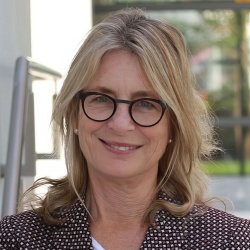 The James Cook Medal is awarded for the most meritorious lifetime contributions to knowledge and society in Australia or its territories made by an individual and conducted mainly in New South Wales. The recipient may be resident in Australia or elsewhere. The James Cook Medal was established by the Council in 1943 following a donation made by Henry Ferdinand Halloran to celebrate his 50 years as a member of the Society and it has been awarded periodically since 1947. In 2023, the Council determined to award it annually.
The James Cook Medal is awarded for the most meritorious lifetime contributions to knowledge and society in Australia or its territories made by an individual and conducted mainly in New South Wales. The recipient may be resident in Australia or elsewhere. The James Cook Medal was established by the Council in 1943 following a donation made by Henry Ferdinand Halloran to celebrate his 50 years as a member of the Society and it has been awarded periodically since 1947. In 2023, the Council determined to award it annually.
Helen Christensen, from the Black Dog Institute, UNSW Sydney, is a highly innovative scientist who has achieved an unparalleled level of impact on internet-mediated mental health both in Australia and worldwide. She is internationally recognised as founding the use of digital and online technology to deliver evidence-based prevention and intervention therapy for common mental illnesses. Her groundbreaking contributions have spawned a vast international research effort that incorporates academia, business, clinics, and community, not only leading the research field internationally but greatly improving the lives of many, many Australians living with mental illness.
RSNSW Edgeworth David Medal
Professor Qilin Wang FRSN
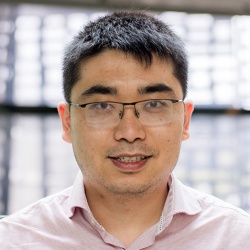 The Edgeworth David Medal is awarded for the most meritorious contributions to knowledge and society in Australia or its territories, conducted mainly in New South Wales by an individual who is from 5–15 years post-PhD or equivalent on 1 January of the year of the award. The recipient may be resident in Australia or elsewhere. The Edgeworth David Medal was established by Council in 1943 in honour of Sir T. W. Edgeworth David FRS, who compiled the first comprehensive record of the geology of Australia, and following a donation made by Henry Ferdinand Halloran to celebrate his 50 years as a member of the Society. It has been periodically awarded since 1948 and in 2023, the Council determined to award it annually.
The Edgeworth David Medal is awarded for the most meritorious contributions to knowledge and society in Australia or its territories, conducted mainly in New South Wales by an individual who is from 5–15 years post-PhD or equivalent on 1 January of the year of the award. The recipient may be resident in Australia or elsewhere. The Edgeworth David Medal was established by Council in 1943 in honour of Sir T. W. Edgeworth David FRS, who compiled the first comprehensive record of the geology of Australia, and following a donation made by Henry Ferdinand Halloran to celebrate his 50 years as a member of the Society. It has been periodically awarded since 1948 and in 2023, the Council determined to award it annually.
Qilin Wang, from the University of Technology Sydney, has achieved international recognition for his contributions to sustainable wastewater treatment and wastewater-based epidemiology. His patented technology can convert wastewater treatment plants into carbon-neutral energy generators by ingeniously harnessing a waste by-product on-site. In addition to this energy innovation, Professor Wang's technology significantly reduces the environmental impact of wastewater treatment by effectively preventing pollution — including antibiotic resistance genes, pathogens, nitrogen, microplastics, and ‘forever chemicals’ – from entering the environment while minimising waste production and land usage.
Furthermore, Professor Wang has pioneered the development of an accurate prediction tool that can forecast hospital admissions due to COVID-19 up to four weeks in advance, relying on wastewater-based epidemiology. His outstanding contributions have been recognised through numerous research and industry awards, including a Eureka Prize for Outstanding Early Career Researcher, a Eureka Prize for Applied Environment Research, an Australian Research Leader in Water Supply & Treatment, a NSW Young Tall Poppy, a Prime Minister’s Prize Finalist, a MIT Technology Review Innovator, and Australia’s Most Innovative Engineer. He secured a tenured full professorship only seven years after PhD completion, a German Humboldt Fellowship for Experienced Researcher, an ARC DECRA Fellowship only six months after his PhD completion, and an ARC Future Fellowship—Level 2 only five years after PhD completion.
RSNSW Aboriginal and/or Torres Strait Islander Scholars Medal
Aunty Frances Bodkin
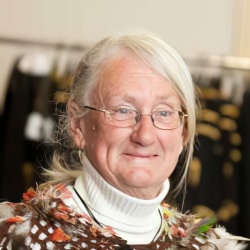 The Aboriginal and/or Torres Strait Islander Scholars Medal is awarded for the most meritorious contributions to knowledge and society made by scholars identifying as Australian Aboriginal or Torres Strait Islander and conducted mainly in New South Wales. Recipients may be resident in Australia or elsewhere. The Aboriginal and/or Torres Strait Islander Scholars Medal was established by the Council in 2023 to reflect the full scope of the Society’s values.
The Aboriginal and/or Torres Strait Islander Scholars Medal is awarded for the most meritorious contributions to knowledge and society made by scholars identifying as Australian Aboriginal or Torres Strait Islander and conducted mainly in New South Wales. Recipients may be resident in Australia or elsewhere. The Aboriginal and/or Torres Strait Islander Scholars Medal was established by the Council in 2023 to reflect the full scope of the Society’s values.
Aunty Frances Bodkin, of Western Sydney University, has made significant contributions to Aboriginal knowledge across multiple disciplines, including medicine, linguistics, the environment, and psychology. Since her first publication in 1986 on native and exotic plants in Australia, Aunty Fran has contributed to 36 different works spanning fields of knowledge such as native flora and fauna, environmental sustainability, Dream time and Ancestral knowledge, climate, D'harawal Language, medicine, and psychology. Her D'harawal Pharmacopeia consists of 1,885 pages of native plants prevalent in D'harawal Country (the Sydney region), their medical uses, and associations with other native plants. Aunty Fran has dedicated herself to teaching others in higher education, schools, and community organisations, and to documenting her knowledge in literature for future generations. Without the contributions of Aunty Fran, undoubtedly a significant amount of Indigenous cultural knowledge would have been lost.
RSNSW Ida Browne Early Career Medal
Dr Brendon Neuen
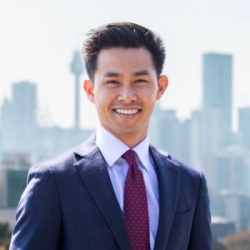 The Ida Browne Early Career Award recognises the most meritorious contributions to knowledge and society in Australia or its territories by an individual from 0–5 years post-PhD or equivalent on 1 January of the year of the award and conducted mainly in New South Wales. The recipient may be resident in Australia or elsewhere. The Ida Browne Medal was established by the Council in 2023 in honour of Ida Browne DSc, a palaeontologist and the first woman President of the Royal Society of NSW, serving from 1953–1954.
The Ida Browne Early Career Award recognises the most meritorious contributions to knowledge and society in Australia or its territories by an individual from 0–5 years post-PhD or equivalent on 1 January of the year of the award and conducted mainly in New South Wales. The recipient may be resident in Australia or elsewhere. The Ida Browne Medal was established by the Council in 2023 in honour of Ida Browne DSc, a palaeontologist and the first woman President of the Royal Society of NSW, serving from 1953–1954.
Brendon Neuen is a Nephrologist and Director of the Kidney Trials Unit at Royal North Shore Hospital, and a Senior Research Fellow at The George Institute for Global Health, UNSW Sydney. He is widely recognised for his expertise in cardio-renal-metabolic medicine. Dr Neuen established the SGLT2 Meta-Analysis Cardio-Renal Trialists' Consortium, bringing together data on more than 90,000 patients to better understand the effects of this class of medicines on different types of patients. His work has directly informed more than 25 major international and national guidelines, position papers, and scientific statements that provide optimal care for people with type 2 diabetes and kidney disease.
RSNSW Clarke Medal and Lecture in Earth Sciences
Professor Moninya Roughan FRSN
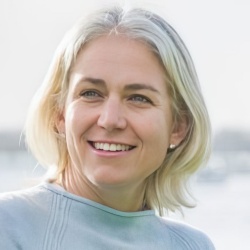 The Clarke Medal and Lecture is awarded for distinguished research in any area of the sciences affecting the planet, excluding Medicine and Veterinary Science, and Agricultural and Environmental Science, and conducted mainly in New South Wales. Recipients may be resident in Australia or elsewhere. The Medal honours Rev. William Branwhite Clarke, a geologist, and a significant figure in the history of the Royal Society of NSW, who served for a decade as a highly influential Senior Vice-President of the Society (noting that in the early years, the Governor of NSW was the President of the Society).
The Clarke Medal and Lecture is awarded for distinguished research in any area of the sciences affecting the planet, excluding Medicine and Veterinary Science, and Agricultural and Environmental Science, and conducted mainly in New South Wales. Recipients may be resident in Australia or elsewhere. The Medal honours Rev. William Branwhite Clarke, a geologist, and a significant figure in the history of the Royal Society of NSW, who served for a decade as a highly influential Senior Vice-President of the Society (noting that in the early years, the Governor of NSW was the President of the Society).
Moninya Roughan, from UNSW Sydney, is an outstanding oceanographer and authority on the dynamics of the East Australian Current, ocean observing and prediction systems, and their application to understanding western boundary currents and continental shelf processes. She currently leads the Coastal and Regional Oceanography Lab at UNSW – where she has made important, far-reaching contributions to our understanding of continental shelf processes and western boundary current warming through the use of new technologies. An internationally acknowledged leader in her field, she is also dedicated to the training of the next generation of scientific leaders.
RSNSW Walter Burfitt Award in Medical and Veterinary Sciences and Technologies
Professor Maria Kavallaris AM FRSN FAHMS
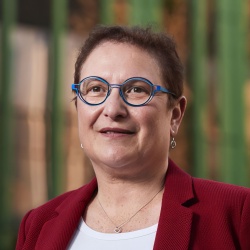 The Walter Burfitt Award recognises distinguished research in any area of the Medical and Veterinary Sciences and Technologies, conducted mainly in New South Wales. Recipients may be resident in Australia or elsewhere. The Walter Burfitt Award honours the life and work of Walter F. Burfitt BA MB ChM BSc, an eminent Sydney surgeon in the 1950s. It was established as a prize with generous support from Dr Burfitt and his wife, and was first awarded in 1929.
The Walter Burfitt Award recognises distinguished research in any area of the Medical and Veterinary Sciences and Technologies, conducted mainly in New South Wales. Recipients may be resident in Australia or elsewhere. The Walter Burfitt Award honours the life and work of Walter F. Burfitt BA MB ChM BSc, an eminent Sydney surgeon in the 1950s. It was established as a prize with generous support from Dr Burfitt and his wife, and was first awarded in 1929.
Maria Kavallaris, from the Children’s Cancer Institute of UNSW Sydney, is an exceptional cancer research leader, innovator, mentor, and role model who has made seminal discoveries on mechanisms of clinical drug resistance and tumour aggressiveness in childhood and adult cancers. Recognised as a world leader in cancer and microtubules, her discoveries have led to both patents and industry partnerships for the development of cancer therapeutics. Crucially, in complement to her exceptional research record, Professor Kavallaris has made outstanding contributions to NSW and Australia via highly influential medical research advocacy and mentoring the next generation of Australian cancer research leaders.
RSNSW Award in the Social and Behavioural Sciences
Scientia Professor Kaarin Anstey FRSN FASSA FAHMS
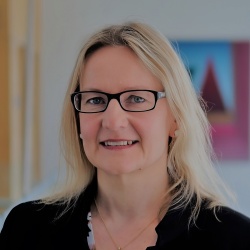 This award recognises distinguished research in any area of the Social and Behavioural Sciences including Psychology, Economics, Management, and related disciplines, conducted mainly in New South Wales. Recipients may be resident in Australia or elsewhere. This Award was established by the RSNSW Council in 2023 to reflect the full scope of the Society’s founding values.
This award recognises distinguished research in any area of the Social and Behavioural Sciences including Psychology, Economics, Management, and related disciplines, conducted mainly in New South Wales. Recipients may be resident in Australia or elsewhere. This Award was established by the RSNSW Council in 2023 to reflect the full scope of the Society’s founding values.
Kaarin Anstey, from Neuroscience Research Australia of UNSW Sydney, is a world leader in cognitive ageing and dementia risk reduction. Her program of research has contributed greatly to the evidence base on dementia prevention through the identification and quantification of risk factors for dementia, the development of risk assessment tools, and the implementation of interventions. Moreover, her work has directly informed public policy and guidelines, both within Australia and globally, particularly in her collaboration with the World Health Organization. As a consequence, she has made an important, sustained, positive impact on the lives of tens of thousands of people in Australia and around the world.
RSNSW Award in the History and Philosophy of Science
Professor Hans Pols FRSN FAHA FASSA
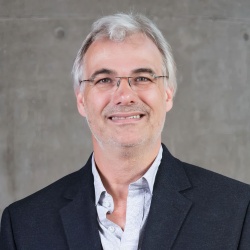 This Award recognises distinguished research in the History and Philosophy of Science conducted mainly in New South Wales. Recipients may be resident in Australia or elsewhere. The Royal Society of NSW History and Philosophy of Science Award was established by the Council in 2013 to reflect the founding values of the Society and was first awarded in 2014.
This Award recognises distinguished research in the History and Philosophy of Science conducted mainly in New South Wales. Recipients may be resident in Australia or elsewhere. The Royal Society of NSW History and Philosophy of Science Award was established by the Council in 2013 to reflect the founding values of the Society and was first awarded in 2014.
Hans Pols, from the University of Sydney, is the preeminent historian of science and medicine in Indonesia and Southeast Asia and a leading international scholar of the development of global neurosciences. His principal work, Nurturing Indonesia: Medicine and Decolonisation in the Dutch East Indies, transforms our understanding of the connections of scientific research with nationalism and decolonisation at the same time as it makes key contributions to the global history of science. His groundbreaking studies in the history of twentieth-century psychiatry are exemplars of science historiography, illuminating contemporary predicaments and showing how scientific insight is shaped by and shapes national projects and global concerns.
RSNSW Bicentennial Postgraduate Scholarships
The RSNSW Bicentennial Postgraduate Scholarships are awarded each year to recognise outstanding achievements by young researchers in any academic field. Applicants must have completed an undergraduate degree within NSW or the ACT and must on 1 January of the year of nomination be enrolled as research students in the first or second year of their first higher degree at a university or other research institution in NSW or the ACT.
For 2023, two RSNSW Scholarships have been awarded:
- Ms Sasha Bailey — PhD Candidate, University of Sydney
- Mr Jayden McKinnon — PhD Candidate, University of Wollongong
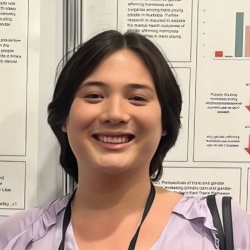 Ms Sasha Bailey is a second-year PhD and research assistant in the Matilda Centre for Research in Mental Health and Substance Use at the University of Sydney, having previously completed a BA in Philosophy and a Master Of Public Health, also at the University of Sydney. Since commencing her PhD in March 2022, she has received 19 awards/prizes and has published two journal articles as a first author with a further 12 first-author publications under review. In addition to her research program, Sasha holds a number of leadership and governance roles in the Matilda Centre and the wider LGBTQA+ community.
Ms Sasha Bailey is a second-year PhD and research assistant in the Matilda Centre for Research in Mental Health and Substance Use at the University of Sydney, having previously completed a BA in Philosophy and a Master Of Public Health, also at the University of Sydney. Since commencing her PhD in March 2022, she has received 19 awards/prizes and has published two journal articles as a first author with a further 12 first-author publications under review. In addition to her research program, Sasha holds a number of leadership and governance roles in the Matilda Centre and the wider LGBTQA+ community.
The focus of Sasha’s research is on improving the understanding and prevention of mental ill-health and substance use among gender and sexuality-diverse (LGBTQA+) young people in Australia and internationally. Using data from the Longitudinal Study of Australian Children, she has produced Australia’s first-ever population-level, nationally representative estimates of the number of LGBTQA+ young people affected by mental ill-health, substance use, victimisation, and discrimination, within Australia, identifying just how much an LGBTQA+ affirming school climate can protect and buffer against the mental ill-health effects of victimisation and discrimination. Her research is complemented by her active advocacy for improved LGBTQA+ public health action, with her nominators noting that she is called upon routinely by senior executives at the University to deliver speeches about LGBTQA+ visibility at the University.
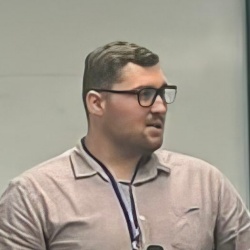 Mr Jayden McKinnon is a PhD student in the Molecular Horizons Research Institute and the School of Chemistry and Molecular Biosciences at the University of Wollongong following his BMedSc (Hons) degree studies at UoW. His PhD studies are in the field of mass spectroscopy imaging, the aim of which is the development of innovative methods for the detection of metabolites in tissues.
Mr Jayden McKinnon is a PhD student in the Molecular Horizons Research Institute and the School of Chemistry and Molecular Biosciences at the University of Wollongong following his BMedSc (Hons) degree studies at UoW. His PhD studies are in the field of mass spectroscopy imaging, the aim of which is the development of innovative methods for the detection of metabolites in tissues.
Now in his second year of his PhD, he has achieved a first-author paper in the journal, Analytical Methods. In addition, he has been recognised through two significant awards at the University of Wollongong Higher Degree Research Symposium – the Student Choice Award for Best Oral Presentation and the Best Oral Presentation Award. In addition to his research studies, Jayden has also taken on academic and scientific leadership positions, notably as the Vice President of the Medical and Health Sciences Association at the University of Wollongong from 2018-2020, and currently as a student representative on the board of the Australian and New Zealand Society for Mass Spectrometry.
RSNSW Bicentennial Early Career Research and Service Citations
The RSNSW Bicentennial Early Career Research and Service Citations are awarded each year to recognise outstanding contributions to research and service to the academic and wider community. Applicants must on 1 January of the year of nomination be no more than 5 years after the award of their PhD or equivalent by a university or other research institution in NSW or the ACT.
For 2023, three RSNSW Early Career Citations have been awarded:
- Dr Jacinta Martin — University of Newcastle
- Dr Abhimanu Pandey — Australian National University
- Dr Shoujin Wang — University of Technology Sydney
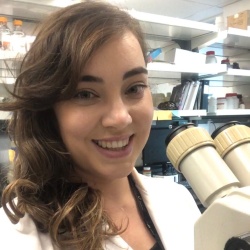 Since 2021, Dr Jacinta Martin has been a Lecturer and postdoctoral researcher in the University of Newcastle (UoN) College of Engineering, Science and Environment and the Hunter Medical Research Institute (HMRI) Infertility and Reproduction Research Program. She works with a multidisciplinary group of researchers using human and animal models to characterise the processes of gamete maturation — the process by which oocytes and spermatozoa are formed. The goal of her research is to improve the understanding of factors that lead to infertility and pregnancy loss in women.
Since 2021, Dr Jacinta Martin has been a Lecturer and postdoctoral researcher in the University of Newcastle (UoN) College of Engineering, Science and Environment and the Hunter Medical Research Institute (HMRI) Infertility and Reproduction Research Program. She works with a multidisciplinary group of researchers using human and animal models to characterise the processes of gamete maturation — the process by which oocytes and spermatozoa are formed. The goal of her research is to improve the understanding of factors that lead to infertility and pregnancy loss in women.
After graduating from UoN with a PhD in 2019, Jacinta has established a strong academic record that includes 24 research articles and nearly $1 million in research funding. During her PhD, Jacinta received the "Best HDR Publication Award" in 2016 and 2018 and received a number of travel grants that allowed to to present her work at major international meetings. Following her PhD, she undertook post-doctoral research at the McGill University Health Centre in Montreal, Canada from 2019–2021. Dr Martin's academic career extends beyond her personal research performance into the development of her discipline. She has served the Society for the Study of Reproduction (USA) on the Board of Directors as their trainee representative and has had significant professional roles at McGill University, HMRI, and the University of Newcastle as a facilitator, chair, adjudicator, and committee member.
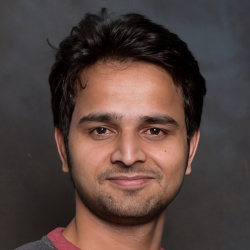 Dr Abhimanu Pandey is a postdoctoral researcher at the John Curtin School of Medical Research (JCSMR) at the Australian National University, following the completion of his PhD at JCSMR in 2022 and undergraduate studies in India prior to that. He works in the research group of Professor Si Ming Man FRSN which studies innate immunity and inflammasomes. At the time of the application for this award, he has 15 peer-reviewed publications, nine of which were generated during his PhD, and has been awarded three early career research grants. In his research, he has identified a novel biomarker for bowel cancer that can sense DNA and inhibit the development and progression of bowel inflammation and cancer. The identification of precise structural locations within the immune protein that are druggable, using small molecule drugs, is expected to be transformational in the improvement of treatment outcomes in patients with inflammation and cancer.
Dr Abhimanu Pandey is a postdoctoral researcher at the John Curtin School of Medical Research (JCSMR) at the Australian National University, following the completion of his PhD at JCSMR in 2022 and undergraduate studies in India prior to that. He works in the research group of Professor Si Ming Man FRSN which studies innate immunity and inflammasomes. At the time of the application for this award, he has 15 peer-reviewed publications, nine of which were generated during his PhD, and has been awarded three early career research grants. In his research, he has identified a novel biomarker for bowel cancer that can sense DNA and inhibit the development and progression of bowel inflammation and cancer. The identification of precise structural locations within the immune protein that are druggable, using small molecule drugs, is expected to be transformational in the improvement of treatment outcomes in patients with inflammation and cancer.
In addition to his research profile, Dr Pandey has demonstrated leadership within his profession. Within JCSMR, he organised the first School HDR Student Conference in 2022, while within the wider University, he volunteers and raises funds for the Multiple Sclerosis Mega Swim event, and serves as a mentor for undergraduate science students. Externally, he is a reviewer for five international research journals.
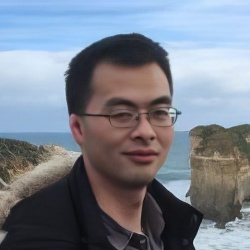 Dr Shoujin Wang is a Lecturer in Data Science at the University of Technology Sydney, following the completion of his PhD at UTS in 2019. His research interests are in data mining, machine learning, recommender systems, and fake news mitigation, and in the past five years, he has authored 60 publications that have received 2,400 citations. His research record includes a number of IEEE awards and a growing research grant profile.
Dr Shoujin Wang is a Lecturer in Data Science at the University of Technology Sydney, following the completion of his PhD at UTS in 2019. His research interests are in data mining, machine learning, recommender systems, and fake news mitigation, and in the past five years, he has authored 60 publications that have received 2,400 citations. His research record includes a number of IEEE awards and a growing research grant profile.
His research activities have a range of real-world applications and impacts, notably his pioneering work on fake news mitigation via recommendation that is helping to mitigate disinformation on the web. His work addresses challenges faced across a range of sectors including infrastructure, banking, accounting, and agriculture, and involves collaborators that include EY, Sydney Water, Suncorp, and Agriweb. His work with Sydney Water has led to a novel prediction model that automatically and effectively provides early detection of water quality issues in reservoir catchments.
RSNSW Jak Kelly Award
The RSNSW Jak Kelly Award recognises excellence in postgraduate research in physics annually. The winner is selected from presenters at each year’s Australian Institute of Physics NSW Branch Postgraduate Awards, as advised to the Awards Committee of the Royal Society of NSW. This Award honours the life of Jak Kelly (1928-2012), Professor and Head of Physics at the University of NSW (1985-1989), Honorary Professor at the University of Sydney (2004), and President of the Royal Society of NSW (2005-2006). It was first awarded in 2010.
For 2023, the Jak Kelly Award goes to Mr Jaime Andres Alvarado-Montes of Macquarie University.
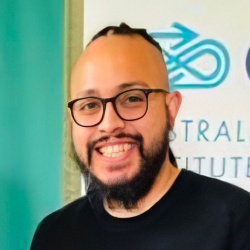 Mr Jaime Andres Alvarado-Montes, originally from Colombia, is a PhD candidate in the School of Mathematical and Physical Sciences at Macquarie University. His research focusses on the planetary sciences, with an emphasis on extrasolar planets, moons, rings, asteroids, and comets. His award-winning presentation at the 2023 Australian Institute of Physics NSW Postgraduate Awards was titled “Tidal Evolution and Detectability of Close-in Extrasolar Systems”. In this talk, he discussed how close-in planetary systems, composed of giant bodies, can help us test tidal models and work as a probe to constrain the interior structure of stars and planets and showed how tidal interactions affect the evolution of planetary systems. He concluded by noting that despite the plethora of exoplanets discovered to date, none of them have the same characteristics as those of our unique solar system and that research, such as his, can provide a better understanding of how features of our solar system, yet to be discovered around other stars, may eventually be detected through improved models of planetary tidal evolution.
Mr Jaime Andres Alvarado-Montes, originally from Colombia, is a PhD candidate in the School of Mathematical and Physical Sciences at Macquarie University. His research focusses on the planetary sciences, with an emphasis on extrasolar planets, moons, rings, asteroids, and comets. His award-winning presentation at the 2023 Australian Institute of Physics NSW Postgraduate Awards was titled “Tidal Evolution and Detectability of Close-in Extrasolar Systems”. In this talk, he discussed how close-in planetary systems, composed of giant bodies, can help us test tidal models and work as a probe to constrain the interior structure of stars and planets and showed how tidal interactions affect the evolution of planetary systems. He concluded by noting that despite the plethora of exoplanets discovered to date, none of them have the same characteristics as those of our unique solar system and that research, such as his, can provide a better understanding of how features of our solar system, yet to be discovered around other stars, may eventually be detected through improved models of planetary tidal evolution.
RSNSW Service Awards
Royal Society of NSW Medal
Ms Judith Wheeldon AM FRSN
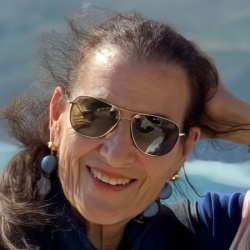 The Royal Society of New South Wales Medal recognises an individual who has made meritorious contributions to the advancement of knowledge in any field and also to the Society’s administration, organisation, and endeavours. The RSNSW Medal was first awarded in 1884, revived in 1943, and has been awarded periodically thereafter.
The Royal Society of New South Wales Medal recognises an individual who has made meritorious contributions to the advancement of knowledge in any field and also to the Society’s administration, organisation, and endeavours. The RSNSW Medal was first awarded in 1884, revived in 1943, and has been awarded periodically thereafter.
Judith Wheeldon is first mentioned in the annual report of the RSNSW in 2013, being one of four panellists in the Society’s third Forum at the Powerhouse Museum. Elected as a Fellow of the Society and Councillor in 2014, there began a continuous and meritorious involvement with the Society for the next decade. Her Fellowship citation reads “Judith Wheeldon is recognised for eminent and long-standing service to Australian secondary education at senior levels and for service to professional organisations.”
Judith was elected to the RSNSW Council as a member in 2014 and as Vice-President in 2015, a position she held until her retirement in 2023. In addition, she served as a member of the Fellows, Nominations, Membership, Events, Voice and Outreach, Community Engagement, and Fundraising Committees. Her contributions to the Society are typified by her work to establish strong relationships with other organisations including the State Library of NSW, the Sydney Mechanics School of Arts, and Government House in Sydney where she established the series “Ideas@theHouse.”
Judith’s impact in the wider community is as a leader in education and the arts. She is a recognised innovator in the education of girls through her roles as principal or headmistress of four schools including Abbotsleigh and Queenwood. As a director on the Australian Learning and Teaching Council, Judith contributed to the management and planning of teaching across Australia and was a Trustee of the Museum of Applied Arts and Science (Powerhouse Museum). She was honoured as a Member of the Order of Australia in 2006 in “Recognition of contribution to Australian public life, specifically in education leadership and pro bono work in the community.”
Royal Society of NSW Citation
Mr Jason Antony MRSN
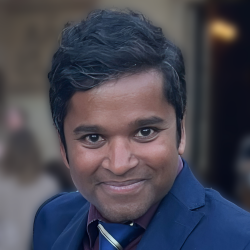 The Royal Society of New South Wales Citations recognise individuals who have made significant contributions to the Society, but who have not been recognised in any other way. The RSNSW Citation was first awarded in 2019.
The Royal Society of New South Wales Citations recognise individuals who have made significant contributions to the Society, but who have not been recognised in any other way. The RSNSW Citation was first awarded in 2019.
Jason Antony MRSN has been indispensable in the production of fifteen issues of the Journal & Proceedings of the Royal Society since 2016 and as editor (and producer) of 28 issues of the Bulletin from 2020 to 2023. To appear, publications — both on-line and printed — require knowledge, skills, and effort. Providing all of these, Jason has contributed hugely to the improved presentation and appeal of both publications, important for the Society’s outreach, heritage, and communications. This Citation is a measure of his value and continuing importance to the Society.

